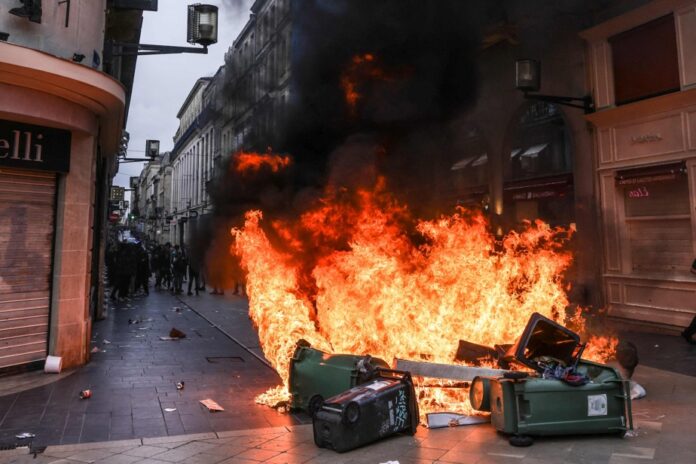(Paris) Opponents of pension reform in France continued to express their anger on Saturday with new rallies and growing blockades in refineries, two days after the decision of the executive to pass by force in Parliament.
The fear of a radicalization of the protest led the authorities to ban any gathering on the Parisian place of Concorde, close to the National Assembly and the presidential palace of the Élysée, where clashes broke out Thursday and Friday evening .
Since the government’s decision on Thursday to have the reform adopted without a vote in the National Assembly, the mobilization has hardened, carried by few young activists, but tired of the massive demonstrations which have followed one another since mid-January to oppose raising the retirement age from 62 to 64.
To justify the ban on gatherings on Saturday in Concorde, the prefecture reported “serious risks of disturbances to public order and safety”.
Friday evening, like the day before, thousands of people had gathered in this very large square which opens in particular on the avenue des Champs-Élysées.
By nightfall, several hundred people had confronted the police with bottles and fireworks, who responded with tear gas.
The day before, 10,000 demonstrators had gathered there, ulcerated by Emmanuel Macron’s decision to activate Article 49.3 of the Constitution allowing the adoption of a text without a vote.
Denouncing “a denial of democracy”, the inter-union called for intensifying the mobilization while the government will face two motions of censure on Monday which, if adopted, would lead to its overthrow and the abandonment of this project on which Emmanuel Macron plays a lot of his credit.
Rallies were planned throughout the weekend: Place d’Italie in Paris, in the second French city Marseille, but also in Brest (west), Toulon, Montpellier (southeast)… A new day of national action is scheduled for Thursday.
A union classified on the left, the CGT made an impression by announcing on Saturday that the largest refinery in the country, located in Normandy (north-west) and operated by TotalEnergies, had begun to be shut down.
A milestone has thus been crossed. Since the start of the movement, fuel shipments have been blocked, but none of the seven French refineries had been completely shut down.
Very heavy technically, the operation will take several days and should not cause immediate fuel shortages in the country’s service stations, but it could spread.
At least two other refineries, that of PetroIneos in Lavéra (south-east) and that of TotalEnergies in Gonfreville-l’Orcher (north-west), could be shut down no later than Monday, warned the CGT union.
French Industry Minister Roland Lescure hinted on Saturday that the government could retaliate by requisitioning agents.
Other key sectors of the economy also remain disrupted by the mobilization, particularly in transport and the collection of household waste.
In Paris, around 10,000 tonnes of waste are awaiting collection on the sidewalks of the capital even if the town hall noted, on Saturday, a “stabilization” of this stock.
The government also assured that agents would be requisitioned to start collecting waste, which overflows in several districts of the city.
Throughout the rallies, the anger was palpable.
“What am I going to answer to young people who tell me ‘voting is useless’? I elected my deputy and he is deprived of the vote. We are in full democratic denial, ”explained a demonstrator in Besançon (east) where some participants burned their voter cards.
In Nantes and Brest, in the west, where thousands of people pounded the pavement on Saturday, the demonstrations were marked by tensions with the police.
The government has chosen to raise the retirement age to respond to the financial deterioration of pension funds and the aging of the population.
France is one of the European countries where the legal age of departure is the lowest, even if the systems are not completely comparable.


















